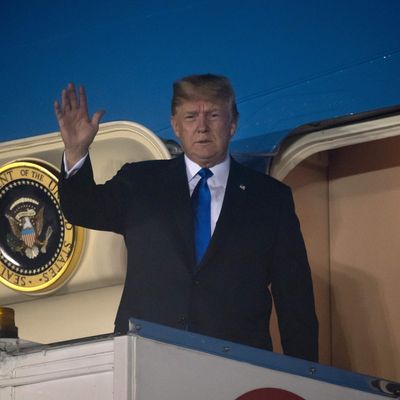
The G7 in Canada this weekend featured a number of firsts in international affairs — the first time a U.S. president repudiated a document he had signed; the first time an entire alliance had turned on Washington in public; the first time an American president got his economics exactly backward in public by claiming that the U.S. subsidizes allies who actually, by continuing to buy dollars and invest in the U.S., subsidize us.
Perhaps the world leader least surprised by these developments will have been Kim Jong-un. If the G7 fiasco suggests a number of lessons, Kim seems already to have learned them — and structured this week’s Singapore Summit accordingly:
Get what you want in the photo op
The real value of talking to Trump is to get the photo of you and him talking, and to get him to say something in the process. Trump is a made-for-cable president, and will reliably do things that make good TV. The Saudis and their orb understood this; the Chinese and their private tour of the Forbidden City as well. The Trump administration and Pyongyang have worked together to set up a made-for-cable summit. It presents Kim dialoguing as an equal with the leader of a nation whose armed forces and economy are hundreds of times larger than his — a status North Korean leaders have sought for decades. And it presents Trump days of media coverage with himself at the center, doing something unprecedented.
What Trump said in the 2016 campaign is what he meant Trump really does feel more warmly toward Vladimir Putin — and quite possibly, Kim Jong-Un — than toward the countries that have partnered with the U.S. to build and defend the international system for seven decades. That’s not a negotiating pose. He is not interested in revising his view that our allies have ripped us off. He truly does believe in the force of personality (his) and the strength of person-to-person relationships, including threats, over the power of institutions and norms. Most pointedly, he believes institutions and norms exist to serve leaders’ personal ambitions, rather than the other way around. He told the world that, if laws prohibited torture or war crimes, they should be changed, and if alliances didn’t favor Washington to his approval, they should be ripped up. Many in the U.S. and abroad chose to believe he was exaggerating, or didn’t understand. They were wrong.
The norms of traditional diplomacy are not much help
This president does not feel bound by the conventions of diplomacy — and of good-faith negotiation more broadly — that what you say in the room continues to hold outside the room. He sees others’ desire to reach agreement on something — anything — as a sign of weakness. Diplomacy assumes value in continuity and stability, while Trump builds his bonds with his base when he is able to present himself as the destroyer of convention and disrupter of established habits.
Americans may disagree with Trump, but are not willing to restrain him
From John McCain on down, Americans are speaking out today to say that Trump doesn’t represent the U.S. But McCain and his colleagues have been quite uninterested in restraining Trump through the legislative process, or even passing resolutions of disapproval. Foreigners, too, can read Trump’s approval numbers in his own party. The U.S. Constitution provides alternate power centers, even for foreign affairs — but all the angst on Twitter is meaningless unless congressional leaders choose to take up their power. This is American foreign policy now.
Nature abhors a vacuum
Trump’s opponents at home may be paralyzed, but his competitors abroad are not. Chinese, Russian and even Syrian leaders are circling Pyongyang to pick up what Trump leaves on the table. In the case of Syria, terrifyingly, that could include nuclear weapons technology. French and German leaders came to Canada with a plan to press Trump together — and they will keep going in managing their economic and political power in opposition to Washington.
It’s time to brush up on the history of what a great power’s fall looks like
Remember how the run-up to World War I is marked by a series of diplomatic moves that seem, in hindsight, inexplicably foolish? Or the painful futility of the late Ottoman Empire? Or the thrashing of tsarist Russia in the opening years of the 20th century? Or, just read Mary Beard on late Rome.
But you have to give Trump credit: In none of those cases will you find a great power willfully dismantling its own alliances. He is truly making decline great again.





























